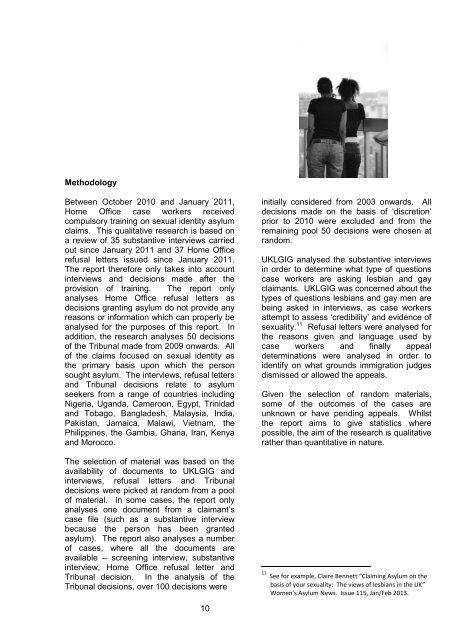Missing-the-Mark
Missing-the-Mark
Missing-the-Mark
You also want an ePaper? Increase the reach of your titles
YUMPU automatically turns print PDFs into web optimized ePapers that Google loves.
Methodology<br />
Between October 2010 and January 2011,<br />
Home Office case workers received<br />
compulsory training on sexual identity asylum<br />
claims. This qualitative research is based on<br />
a review of 35 substantive interviews carried<br />
out since January 2011 and 37 Home Office<br />
refusal letters issued since January 2011.<br />
The report <strong>the</strong>refore only takes into account<br />
interviews and decisions made after <strong>the</strong><br />
provision of training. The report only<br />
analyses Home Office refusal letters as<br />
decisions granting asylum do not provide any<br />
reasons or information which can properly be<br />
analysed for <strong>the</strong> purposes of this report. In<br />
addition, <strong>the</strong> research analyses 50 decisions<br />
of <strong>the</strong> Tribunal made from 2009 onwards. All<br />
of <strong>the</strong> claims focused on sexual identity as<br />
<strong>the</strong> primary basis upon which <strong>the</strong> person<br />
sought asylum. The interviews, refusal letters<br />
and Tribunal decisions relate to asylum<br />
seekers from a range of countries including<br />
Nigeria, Uganda, Cameroon, Egypt, Trinidad<br />
and Tobago, Bangladesh, Malaysia, India,<br />
Pakistan, Jamaica, Malawi, Vietnam, <strong>the</strong><br />
Philippines, <strong>the</strong> Gambia, Ghana, Iran, Kenya<br />
and Morocco.<br />
The selection of material was based on <strong>the</strong><br />
availability of documents to UKLGIG and<br />
interviews, refusal letters and Tribunal<br />
decisions were picked at random from a pool<br />
of material. In some cases, <strong>the</strong> report only<br />
analyses one document from a claimant’s<br />
case file (such as a substantive interview<br />
because <strong>the</strong> person has been granted<br />
asylum). The report also analyses a number<br />
of cases, where all <strong>the</strong> documents are<br />
available – screening interview, substantive<br />
interview, Home Office refusal letter and<br />
Tribunal decision. In <strong>the</strong> analysis of <strong>the</strong><br />
Tribunal decisions, over 100 decisions were<br />
initially considered from 2003 onwards. All<br />
decisions made on <strong>the</strong> basis of ‘discretion’<br />
prior to 2010 were excluded and from <strong>the</strong><br />
remaining pool 50 decisions were chosen at<br />
random.<br />
UKLGIG analysed <strong>the</strong> substantive interviews<br />
in order to determine what type of questions<br />
case workers are asking lesbian and gay<br />
claimants. UKLGIG was concerned about <strong>the</strong><br />
types of questions lesbians and gay men are<br />
being asked in interviews, as case workers<br />
attempt to assess ‘credibility’ and evidence of<br />
sexuality. 11 Refusal letters were analysed for<br />
<strong>the</strong> reasons given and language used by<br />
case workers and finally appeal<br />
determinations were analysed in order to<br />
identify on what grounds immigration judges<br />
dismissed or allowed <strong>the</strong> appeals.<br />
Given <strong>the</strong> selection of random materials,<br />
some of <strong>the</strong> outcomes of <strong>the</strong> cases are<br />
unknown or have pending appeals. Whilst<br />
<strong>the</strong> report aims to give statistics where<br />
possible, <strong>the</strong> aim of <strong>the</strong> research is qualitative<br />
ra<strong>the</strong>r than quantitative in nature.<br />
11 See for example, Claire Bennett “Claiming Asylum on <strong>the</strong><br />
basis of your sexuality: The views of lesbians in <strong>the</strong> UK”<br />
Women’s Asylum News. Issue 115, Jan/Feb 2013.<br />
10


